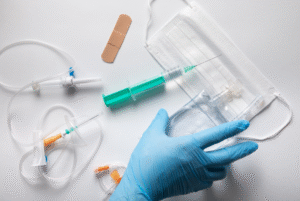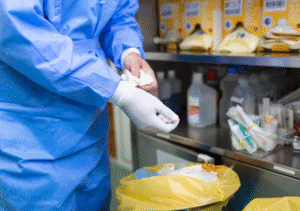Hazardous Waste Collection for Hospitals & Laboratories in Dubai
Hospitals, diagnostic centers, medical research institutes, and general laboratories generate a lot of waste that poses serious threats to human health and the environment. This is particularly true in Dubai, where the health infrastructure is subject to rapid expansion and strict regulatory regimes.
According to the WHO, about 15% of the waste generated in hospitals and laboratories is infectious, toxic, and flammable. This hazardous waste needs to be collected, segregated, stored, and treated with utmost care.
And to do that, healthcare facilities need to put in place robust hazardous waste collection policies and practices.
This blog lists some effective strategies that every healthcare center and medical laboratory in Dubai can implement to make sure they adhere to every regulatory standard and legal requirement concerning hazardous medical waste collection and disposal, so keep on reading till the end.
- What is Hazardous Waste in Hospital and Laboratory Settings?
- Strategies for Hazardous Waste Collection in Dubai Hospitals and Laboratories
- Segregation of Hazardous Waste at the Point of Generation
- Temporary On-Site Storage
- Waste Collection and Transportation
- Treatment and Disposal of Hazardous Waste
- Staff Training and Accountability
- Documentation and Audits
- GlobalEX UAE: Your Reliable Hazardous Waste Collection Partner in Dubai

What is Hazardous Waste in Hospital and Laboratory Settings?
In hospital and laboratory settings, hazardous waste refers to waste that is infectious, toxic, radioactive, genotoxic, or capable of causing physical injury to humans and danger to the environment in general.
The following are key types of medical waste that are considered hazardous.
- Infectious Waste: Blood-contaminated waste, bodily fluids, pathogens from lab cultures, contaminated bandages, waste from infected patients.
- Pathological Waste: Human tissues, organs, body parts, unused blood products.
- Sharp Waste: Needles, syringes, scalpels, blades, and broken glass.
- Pharmaceutical Waste: Expired or contaminated drugs, vaccines, and items like used vials and bottles.
- Chemical Waste: Solvents, reagents, disinfectants, sterilants, and heavy metals such as mercury from broken thermometers.
- Radioactive Waste: liquid, solid, or gaseous waste contaminated with radionuclides.
- Cytotoxic Waste: Waste from cancer therapies and related chemicals.

Strategies for Hazardous Waste Collection in Dubai Hospitals and Laboratories
Ensuring safe and compliant hazardous waste collection in hospitals & laboratories in Dubai involves several steps. From the moment the waste is generated to the time when it is disposed of or treated, there are several things you need to bear in mind.
The following are some proven strategies that can help you collect and handle hazardous waste in a safe and efficient manner.
- Segregation of Hazardous Waste at the Point of Generation
Hospitals and laboratories must pay attention to the segregation of hazardous and non-hazardous waste at the point of generation. The use of color-coded bins and special puncture-resistant containers is recommended to ensure immediate containment of infectious and sharp waste.
For toxic, liquid waste, labelled and bunded containers must be used. To further facilitate better medical waste collection in Dubai, hospitals and labs can set up station-based segregation points with visual signage.
- Temporary On-Site Storage
After the segregation, the hazardous waste must be stored in leak-proof areas with full temperature control and security. Dubai’s regulations demand that the hazardous waste must be stored in independent storage areas and in labeled, refrigerated containers with temperature control.
These facilities need to keep a record of the type, volume, and date of the hazardous waste to further show compliance.
- Waste Collection and Transportation
Next up, the hospitals and labs need to contact a reputable service that offers hazardous waste collection in Dubai. This Dubai Municipality-authorized company will be responsible for regularly collecting, transporting, and destroying the hazardous waste.
It is required that you hire a service that complies with vehicle labelling, tracking, and signage requirements.

- Treatment and Disposal of Hazardous Waste
DHA regulations in Dubai strictly prohibit the disposal of hazardous waste into the regular sewage. Instead, this waste should go to Dubai Municipality-approved and licensed waste treatment and disposal facilities.
Depending on the type of waste, it needs to be disposed of as follows.
- Infectious waste must be sterilized.
- Liquid waste must undergo chemical treatment.
- Pathological waste must be incinerated.
- Less hazardous waste can go to landfills with thick liners and leachate collection systems.
- Staff Training and Accountability
Hospitals and laboratories must pay attention to recurring training of their staff on hazardous waste collection protocols, including segregation, PPE use, spill response, and signage.
Some hospitals in Dubai have hired waste management officers who oversee compliance, register maintenance, and audits. These professionals also coordinate with waste collectors to ensure timely waste removal.
- Documentation and Audits
Ongoing monitoring and documentation of your hazardous waste collection processes is also necessary to ensure compliance. You need to track and document key metrics like hazardous waste generated per department, number of spill incidents, collection turnaround times, etc.
You also need to audit waste storage rooms, containers, transport contracts, and other waste collection-related processes. Reviewing and updating your hazardous waste collection and management plans annually is another major thing you need to take care of.
GlobalEX UAE: Your Reliable Hazardous Waste Collection Partner in Dubai
Hazardous waste collection and disposal in Dubai requires special expertise. You need a waste collection partner that prioritizes regulatory compliance and environmental sustainability above all else, and that is exactly what you get from GlobalEX, UAE.
We at GlobalEX can handle your hazardous waste collection, transportation, disposal, and treatment with state-of-the-art equipment that ensures safety and environmental responsibility at every step of the process.
Services We Offer
Here are the some major hazardous hospital waste collection solutions that you can get from us.
- We identify and classify hazardous waste according to Dubai’s regulatory standards.
- We provide certified containers and vehicles for safer waste collection and transportation.
- We treat and dispose of your hazardous waste in licensed centers using incineration, chemical neutralization, and secure landfilling.
- We segregate recyclable and reusable materials from the hazardous waste to reduce your environmental impact.
- We document all waste collection and handling processes to ensure compliance with ISO standards and local environmental authority regulations.
- We offer reliable pickup schedules and nationwide service coverage.
Conclusion
Hospitals and laboratories operating in Dubai need to spend considerable resources on hazardous waste collection. This can help them remain compliant and ensure public health protection, occupational safety, and environmental sustainability.
By focusing on proper internal waste segregation and storage and by partnering with professional medical waste collection services, it is possible for any healthcare facility to better manage its hazardous waste while operating in Dubai.
Visit us at GlobalEX today to get the best hazardous waste collection services for hospitals, laboratories, and healthcare centers all over Dubai, UAE.



